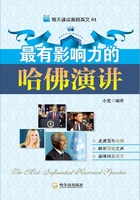
第5章 Our Common Humanity Matters More 我们共同的人性价值更重要(1)
Thank you very much, Samantha, Stephanie, Chris, all the marshals, all the student speakers. Thanks for the gags and the jokes, and you know when I got invited to do this, it was humbling in some ways. They asked Bill Gates to be the Commencement speaker. He‘s got more money than I do and he went to Harvard. And I brought my friend Glenn Hutchins here with me,who’s at his 30th reunion and he had something to do with overseeing the endowment and he explained that Gates was really, really, really rich and I was just rich. And then I thought, well, the students asked me and that‘s a good and besides, Idon’t have to wear a robe.
You‘ve already heard most of what you need to hear today, I think. But I want to focus for a minute on the fact that these graduating classes since 1968 have invited a few non-comedians.First was Martin Luther King,who was killed in April before. I remember that very well because it was my senior year at Georgetown. He was killed in April,before he could come and give the speech. And Coretta came and gave the speech for him here. And you’ve had Mother Teresa and you‘ve had Bono. What do they all have in common? They are symbols of our common humanity and a rebuke even to humorists’ cynicism. Martin Luther King basically said he lived the way he did because we were all caught in what he called an inescapable web of mutuality.
Nelson Mandela,the world‘s greatest living example of that, I believe, comes from a tribe in South Africa, the Xhosa,who call it ubuntu.In English,I am because you are.That led Mother Teresa from Albania to spend her life with the poorest people on earth in Calcutta.It led Bono from his rock stage to worry about innocent babies dying of AIDS,and poor people with good minds who never got a chance to follow their dreams. This is a really fascinating time to be a college senior.I was looking at all of you, wishing I could start over again and thinking I’d let you be president if you let me be 21.
I‘d take a chance on making it all over again if I could do it again.But I think,just think what an exciting time it is.All this explosion of knowledge. Just in the last couple of weeks before I came here,I read that thanks to the sequencing of the human genome,the ongoing research has identified two markers which seem to be high predictors of diabetes,which,as you heard,is a very important thing to me because it’s now predicted that one in three children born in the United States in this decade will develop diabetes. We run the risk that we could be raising a first generation of kids to live shorter lives than their parents. Not because we‘re hungry, but because wedon’t eat the right things and we don‘t exercise. But this is a big deal.Then right after that,I saw that through our powerful telescopes we have identified a planet orbiting one of the hundred stars closest to our solar system that appears to have the atmospheric conditions so similar to ours that life could actually be possible there.Alas,even though it’s close to us in terms of the great universe,it‘s still 20 million light-years away. Unreachable in the lifetime of any young person.So unless there’s a budding astrophysicist in the class that wants to get married in a hurry and then commit three generations and take another couple with him,we‘ll have to wait for them to come to us. It’s an exciting time.It‘s also exciting because of all the diversity.If you look around this audience, I was thinking,I wonder how different this crowd would have looked if someone like me had been giving this speech 30 years ago. And how much more interesting it is for all of us.
It’s a frustrating time, because for all the opportunity, there‘s a lot of inequality. There’s a lot of insecurity and there‘s a lot of instability and unsustainability.Half the world’s people still live on less than two bucks a day.A billion on less than a dollar a day.A billion people go to bed hungry tonight.A billion people won‘t get a clean glass of water today or any day in their lives. One in four of all the people who die this year will die from AIDS,TB, malaria and infections related to dirty water.Nobody in America dies of any of that except people whose AIDS medicine doesn’t work any more,or people who decline to follow the prescribed regime.In the United States in the last decade,we have had six years of economic growth,an all time high in the stock market,a 40-year high in corporate profits.Workers are doing better every year with productivity,but median wages are stagnant.And there‘s actually been in all this so-called recovery a 4 percent increase in the percentage of people working full-timefalling below the poverty line,and a 4 percent increase in the percentage of people working,who with their families,have lost their health insurance.It’s an unequal time.It‘s an uncertain, insecure time because we’re all vulnerable to terror, to weapons of mass destruction,to global pandemics like avian influenza.